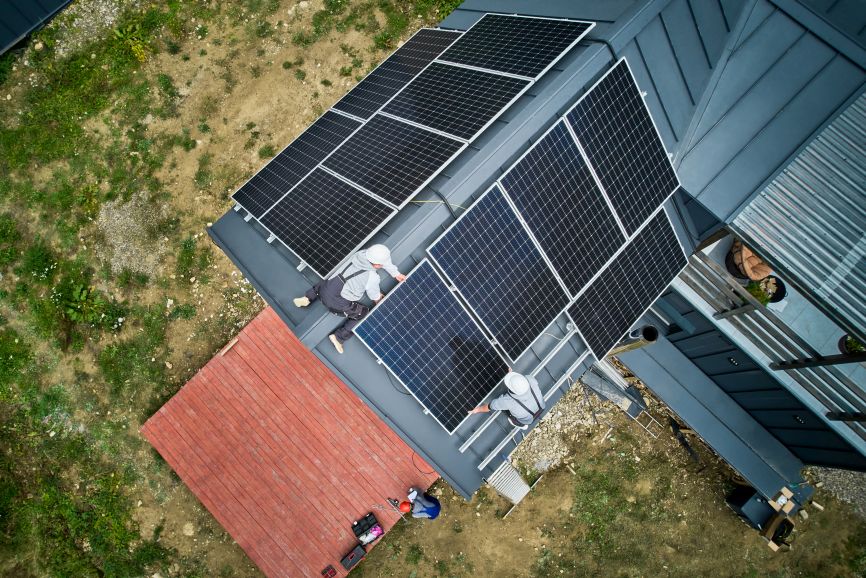Why Dallas Homeowners Care About Solar Wiring
If you’re a Dallas homeowner exploring solar, one question eventually pops up: “Should my solar panels be connected in series or parallel?” It’s not just technical jargon – this choice directly impacts your system’s efficiency, cost, and long-term reliability. Many families feel overwhelmed by the wiring details, worried they’ll make the wrong call and lose out on savings. At First Solar Installers, we help homeowners cut through the confusion by pairing them with certified Dallas experts who design the right configuration for their home, roof space, and utility setup.

What Does Series vs. Parallel Mean in Solar Panels?
Solar panels can be wired in two primary ways:
- Series Connection: Adds voltage while current remains the same.
- Parallel Connection: Adds current while voltage remains the same.
Sometimes, installers combine both in a series-parallel setup for balance.
Series Solar Panel Connections (Adding Voltage)
How it works: The positive terminal of one panel connects to the negative terminal of the next, creating a “string.”
When to use:
- To increase voltage to match inverter or charge controller requirements.
- For long cable runs, where higher voltage minimizes energy loss.
Downsides:
- If one panel is shaded, the whole string’s output drops.
- Less effective in mixed-light conditions (e.g., part of your Dallas roof shaded by a tree).
Parallel Solar Panel Connections (Adding Current)
How it works: All positive terminals are connected together, and all negatives together.
When to use:
- Smaller installations like RVs, cabins, or tiny homes.
- Dallas homes with partial shading or panels facing different directions.
Downsides:
- Requires thicker, more expensive cables.
- Higher amperage can cause more loss over long distances.
Series-Parallel Solar Panel Connections (The Best of Both Worlds)
How it works: Multiple series strings are connected in parallel.
When to use:
- To balance voltage and current for system stability.
- When your inverter requires higher voltage but your home needs higher current capacity.
Benefits:
- Offers flexibility in design.
- Reduces shading impact compared to pure series setups.
- Widely used in residential Dallas installations.
Which Setup Is More Efficient?
There’s no one-size-fits-all answer:
- Series is more efficient for long-distance cable runs.
- Parallel is better for shaded roofs or complex layouts.
- Series-parallel balances both, making it the most common solution for Dallas homes.
Bottom line: Efficiency depends on your roof, energy needs, and utility requirements.
Key Considerations Before Choosing
- Inverter compatibility: Your inverter has voltage/current limits.
- Panel consistency: All panels in a string should match in wattage and voltage.
- Local conditions: Shade patterns in Dallas neighborhoods (trees, chimneys, nearby buildings) play a huge role.
Local Dallas Scenario: Series vs Parallel in Action
One homeowner in North Dallas had a roof partially shaded by a neighbor’s oak tree. A pure series setup meant one shaded panel reduced output for all. By switching to a series-parallel connection, their installer preserved efficiency while keeping inverter requirements met – boosting their annual savings by 20%.
FAQs: Series and Parallel Solar Panels
Q1: Which is better, solar panels in series or parallel?
Neither is “better” – it depends on your system design. Most Dallas homes use series-parallel.
Q2: Can you mix series and parallel connections?
Yes, it’s common. Installers often design hybrid setups for balance.
Q3: Which is more efficient, series or parallel?
Series is efficient for long runs, parallel is better in shaded conditions. Efficiency depends on design.
Q4: Do series-parallel connections cost more?
Slightly, due to extra wiring, but they often deliver the best ROI for homeowners.
Conclusion: Get the Right Solar Setup Without the Guesswork
Choosing between series and parallel wiring isn’t something most homeowners should stress over – but it’s critical for your system’s performance. The wrong choice can cost you efficiency and savings. That’s why at First Solar Installers, we connect you with Dallas-based certified pros who design systems tailored to your home, your utility, and your lifestyle.
Get Your Free Dallas Solar Quote Today or Call us for more information.